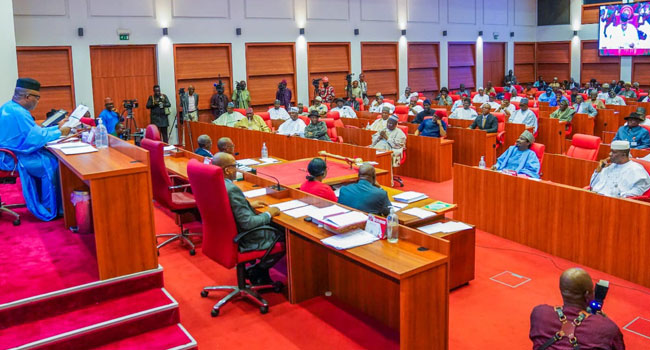Before passage of the 2024 budget into law, the Nigerian Senate on Saturday had added about N1.2 trillion to it.
It increased the budget from N27.5 trillion presented by President Bola Tinubu in November to N28.7 trillion.
The reason for the increment was clearly stated by the upper legislative chambers.
However, the Red chamber pegged the benchmark of oil price at $77.96 per barrel of crude oil to reflect the current market values of the product in the international market.
The Senators approved the oil production rate of 1.78 million barrels per day and the exchange rate of N800 to a US dollar.
Read also: FG Budgets N13trn For 2021 Financial Year
The GDP growth rate was pegged at 3.88 per cent and the budget deficit was approved at N9.18 trillion.
The Senate President, Godswill Akpabio, announced the passage of the budget after the majority of the lawmakers supported it through a voice vote.
The budget was passed after considering a report presented by Chairman of the Senate Committee on Appropriations, Adeola Olamilekan (APC, Ogun West).
Mr Olamilekan, while presenting the report, recommended that N1.7 trillion be approved for Statutory Transfers and N8 2 trillion for Debt service.
The committee chairman also recommended that N8.7 trillion be approved as recurrent (non-debt) expenditure and N9.9 trillion be approved as capital expenditure.
The lawmaker explained that the increase in the appropriation was as a result of a request for additional funding of items which were not listed in the Appropriation Bill as submitted by President Tinubu.
He said the joint National Assembly Committee on Appropriation observed inadequate funding in the budgetary allocation of some Ministries Departments and Agencies (MDAs) of the federal government.
Breakdown
The breakdown of budget as approved by the Senate is as follows:
Aggregate Expenditure -N28,777,404,073,861
Statutory Transfers -N1,742,786,788,150
Recurrent Expenditure – N8,768,513,380,852
Capital Expenditure – N9,995,143,298,028
GDP – 3.88 %
After presenting the report, the Senate dissolved into the Committee of Supply, which considered and passed the budget.
Christened the ‘Budget of Renewed Hope,’ Tinubu said it would ensure micro-economic stability, poverty reduction, greater access to social security, amongst others.
Akpabio assured Nigerians that the bill would be transmitted to the President for expedited passage into law for it to come into effect on January 1, 2024.

